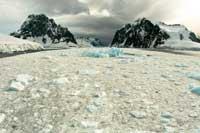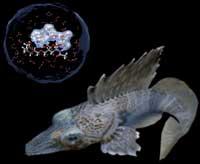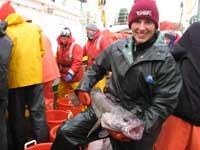Natural antifreezes in Arctic fish

About 50 years ago, researchers found certain proteins in fish against the dangers of freezing. Fish living in cold waters have to be protected in some way to prevent death and accumulate antifreeze substances in their blood. The identification of these proteins or natural antifreezes was a great achievement for scientists. However, until now it was not clear how proteins work.
In Germany, researchers at the Ruhr University in Bochume have addressed this challenge and have worked intensely in recent times. To this end, they have had the collaboration of a group of American experts, who have recently released the Journal of the American Chemical Society. The independent critics of the magazine have valued the work very positively.

The glycoproteins of the species Dissostichus mawsoni have been analyzed against the risks of freezing. (Photo: C. C. Meister, PCII, RUB).
Well, in the study they have used a special technique to closely observe the mechanism of proteins: terahercial spectroscopy. With the help of radiation, the collective movement of water and protein molecules can be recorded.
In this regard, one of the managers of the study explained: “Water molecules normally make a permanent movement in liquid water, such as dance, forming constantly new chemical links. On this occasion, however, we have found that with the presence of these antifreeze proteins, the molecules dance more or less orderly. As it were, the disco-dance becomes minuet”.
Remembrance of an expedition
In the study, the glycoproteins of the species Dissostichus mawsoni, which lives in Antarctica, have been analyzed against the risks of freezing. As a curiosity it is mentioned that one of the researchers of the group weighed fish during an expedition to Antarctica.
“We could see, they say, that the protein has an effect on the water molecules that surround it, especially at a long distance. We’re talking about a layer of dynamic hydration.” In fact, this effect prevents the crystallization of the ice and it seems that thanks to its structure the proteins join the crystals of ice and do not let them grow. “In addition, the effect is stronger at low temperatures than at room temperature.” This would mean a reduction in freezing water temperatures.
This natural antifreeze activity is very reduced by borate. However, due to the complexity of AFP proteins (Antifreeze Protein), the researchers did not experience any changes in the “dance of teraharists”.

Its natural proteins are more effective than the antifreezes that can be found in any car. (Photo: California State University ).
The results have provided scientists with evidence of how AFGP (antifreeze glycopeptides) prevent water freezing: anti-freeze activity is not achieved thanks to a single molecular link between protein and water. That is, this special protective protein disturbs the aqueous dissolution itself at a long distance.
It has now been possible to verify for the first time the direct relationship (to the extent of terahercia) between the function of a protein and its “molecular signature”. Researchers and critics who have valued their work say it is important to clarify it because they have “discovered” natural antifreezes.
Published in 7K.
Buletina
Bidali zure helbide elektronikoa eta jaso asteroko buletina zure sarrera-ontzian











